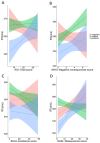"Health Comes First": Action Tendencies to Health-Related Stimuli in People with Health-Anxiety as Revealed by an Emotional Go/No-Go Task
- PMID: 34501693
- PMCID: PMC8431473
- DOI: 10.3390/ijerph18179104
"Health Comes First": Action Tendencies to Health-Related Stimuli in People with Health-Anxiety as Revealed by an Emotional Go/No-Go Task
Abstract
The processing of health-related stimuli can be biased by health anxiety and anxiety sensitivity but, at the moment, it is far from clear whether health-related stimuli can affect motor readiness or the ability to inhibit action. In this preliminary study, we assessed whether different levels of health anxiety and anxiety sensitivity affect disposition to action in response to positive and negative health-related stimuli in non-clinical individuals. An emotional go/no-go task was devised to test action disposition in response to positive (wellness-related), and negative (disease-related) stimuli in non-clinical participants who also underwent well-validated self-report measures of health anxiety and anxiety sensitivity. The main results showed that both health anxiety and anxiety sensitivity biased participants' responses. Importantly, safety-seeking and avoidance behaviors differently affected action disposition in response to positive and negative stimuli. These preliminary results support the idea that health anxiety and anxiety sensitivity could determine a hypervigilance for health-related information with a different perturbation of response control depending on the valence of the stimuli. Health anxiety and health anxiety disorder do form a continuum; thus, capturing different action tendencies to health-related stimuli could represent a valuable complementary tool to detect processing biases in persons who might develop a clinical condition.
Keywords: anxiety sensitivity; attentional bias; go/no-go task; health anxiety; health-related concerns; motor inhibition.
Conflict of interest statement
The authors declare no conflict of interest.
Figures




References
-
- Karademas E.C., Christopoulou S., Dimostheni A., Pavlu F. Health anxiety and cognitive interference: Evidence from the application of a modified Stroop task in two studies. Pers. Individ. Dif. 2008;44:1138–1150. doi: 10.1016/j.paid.2007.11.007. - DOI
Publication types
MeSH terms
LinkOut - more resources
Full Text Sources
Medical

